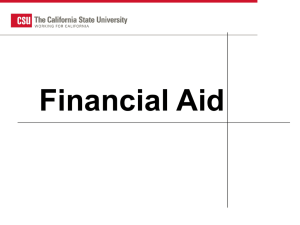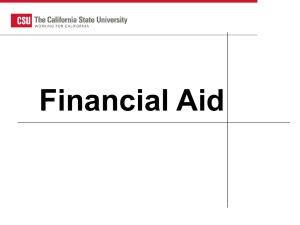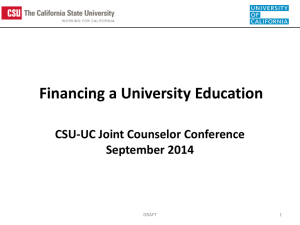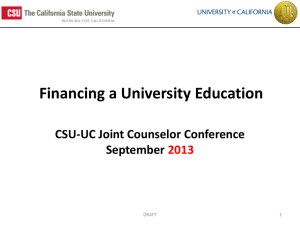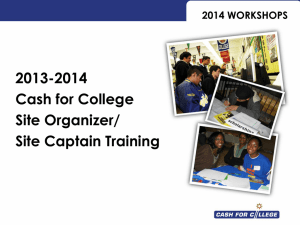Financial Aid - The California State University
advertisement
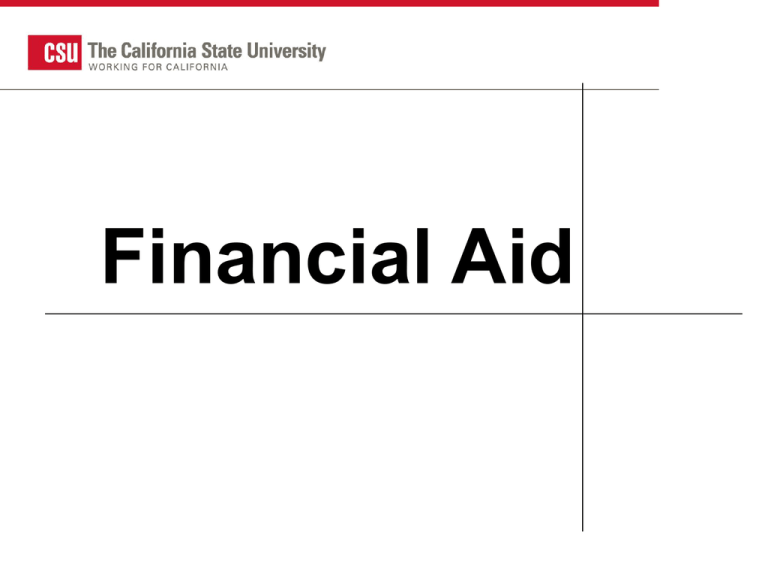
Financial Aid CSU HS Counselor 2007 1 What does it cost? 2013-14 Cost of Attendance* (9 months) At Home On Campus Off Campus Fees Books/Supp Room/Board $6,633 $1,682 $4,453 $6,633 $1,682 $11,648 $6,633 $1,682 $11,798 Trans Personal TOTAL $1,353 $1,338 $15,548 $1,188 $1,338 $22,488 $1,390 $1,338 $22,840 * Systemwide averages, actual amounts will vary by CSU campus. CSU Financial Aid 2011-12 • 306,285 CSU Students received aid (72% of all students) • Nearly $3.6 Billion in Total Aid • 57% of All undergraduates have full cost of tuition covered by grants, scholarships or waivers • $613 million in State University Grant to 133,000 + students • For the 2013-14 academic year we anticipate more than $630 million in State University Grant awards Hot Topics • • • • California Dream Act Middle Class Scholarship Application Changes Special Circumstances NEW: Dream Application Students without lawful immigration status, who qualify for an AB540 nonresident tuition exemption: 1. Dream Application is completed instead of FAFSA (www.caldreamact.org) 2. Used to determine eligibility for state and institutional need based scholarships and grants 3. Cal Grant GPA verification is still required, in addition to the Dream Application, for Cal Grant consideration 4. Some campuses may also have a separate institutional scholarship application that must be filed in addition to the DREAM and FAFSA applications 5. The Admission application fee waiver is also available to students without lawful immigration status, who will qualify for an AB540 nonresident tuition exemption & meet the income guidelines NEW: Dream Application AB 540 General Requirements • The student must have attended a HS (public or private) in CA for 3 or more years, AND • The student must have graduated from a CA HS or attained the equivalent (GED and CA HS proficiency exam also qualify), AND • File an AB540 Affidavit (California Non-Resident Tuition Exemption Request form) with the college or university • Available in the Admissions & Records office of each CSU NEW: Dream Application • DACA: Deferred Action for Childhood Arrivals • Discretionary determination, by the Federal Government, to defer the removal action an individual • Deferred action does not provide an individual with lawful status • Assigned Social Security number for ‘Work Purposes’ only New: Dream • Deferred Action Status • Should still complete the California Dream Application • Not all deferred action students will qualify for AB540 status • AB540 is a California specific statute New: Middle Class Scholarship • Available beginning 2014-15 academic school year • State scholarship for students with family income under $150,000 on a sliding scale • UC and Cal State specific • FAFSA and Dream applicants will be considered for eligibility • Limited information is currently available New: Middle Class Scholarship • For the 14/15, 15/16, and 16/17 school years the MCS amount is reduced • 2014-15 CSU maximum is approximately $766 and for the UC $1,700 • When fully implemented in 2017-18 the maximum award will be 40% of systemwide tuition fees at a UC or CSU New: Application Changes • IRS Data Retrieval tool • FAFSA online • Federal Income Tax returns must be filed to use the IRS data retrieval tool • 1 to 2 weeks after e-file • 6 to 8 weeks after paper filing • Not all online filers will qualify to use the IRS Data Retrieval Tool New: Application Changes • IRS Data Retrieval Tool • Students should NOT wait to file the FAFSA until after the parents file their taxes • Use estimates of income and taxes to file FAFSA early • Update the FAFSA using the IRS Data Retrieval Tool AFTER parents/student file taxes New: Application Changes • Parent Definition • Addition to previous definitions: • Parents are not married to each other and live together, student may select “unmarried and both parents are living together” • This definition includes domestic partners • Both parents income should be reported • Both parents should be included in the house hold size Special Circumstances • Don’t let this delay your FAFSA or Dream application: meet with a financial aid counselor early • Each campus has different policies and procedures for helping these students and families • FERPA: Family Educational Rights and privacy Act • Prevents University staff from discussing student specific information with a third party, including parents, without the student being present Special Circumstances • Death of a Parent • Parent/Student Loss of Employment • • • • Parents Divorce/Separation Student Estrangement from Parents Homeless students Other: Students with unique situations should contact the financial aid department at a CSU campus for guidance Verification • Students selected to submit documents to “verify” information reported on their aid application • Students are notified, usually via email, of a document submission deadline • Typical documents requested: • Tax Transcript • Household worksheet • Proof of Citizenship and/or US Residency Status Verification • Failure to submit documents on time may: • Cause a delay in processing of the student’s award • Result in a student being “dropped” from courses • Missing out on aid that has limited funding • Know a student that can’t turn something in due to a “special circumstance?” • Refer the student to the financial aid office Helpful Websites • • • • FAFSA: http://www.fafsa.gov/ Cal Grants: http://www.calgrants.org/ Dream Application: www.CalDreamAct.org Department of Education - Student guide: http://www.studentaid.ed.gov/ • CSU campus websites: http://calstate.edu/sas/fa_campus_url.shtml • CA Colleges and Career planning: • http://www.californiacolleges.edu/ Questions??? www.calstate.edu
